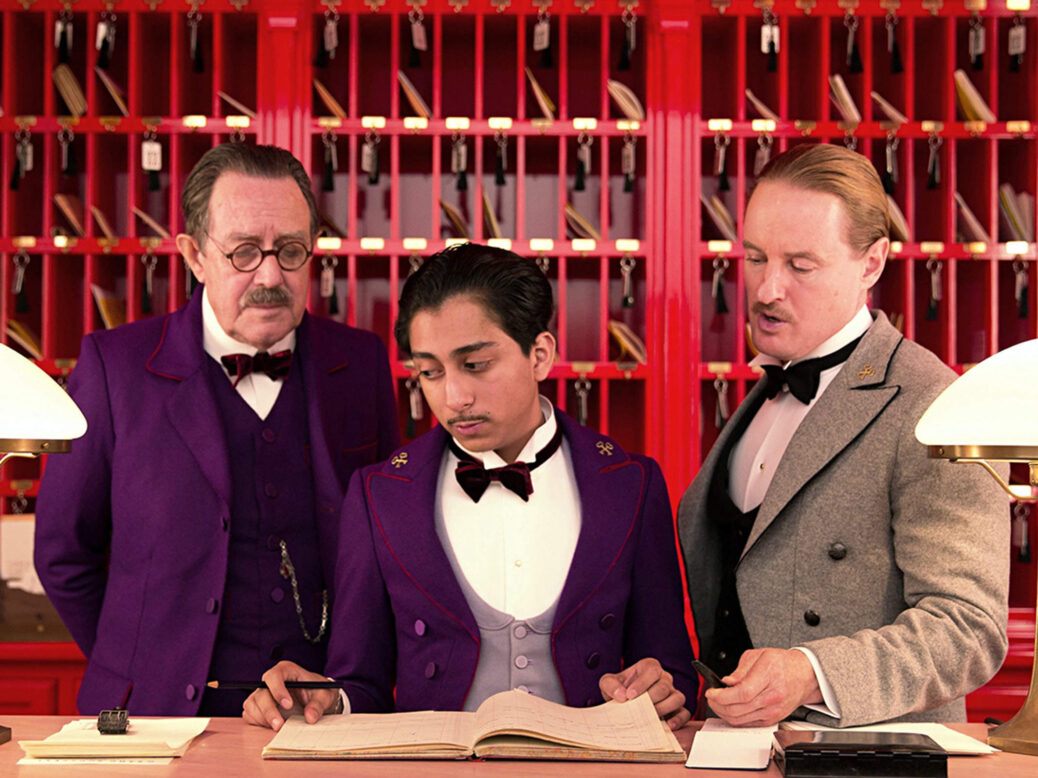
The Grand Budapest Hotel (15)
dir: Wes Anderson
Each year that passes without an announcement that Ralph Fiennes has agreed to be the lead in a Leonard Rossiter biopic is one to be regretted – but his performance in the Wes Anderson film The Grand Budapest Hotel is the next best thing. Playing Gustave H, a voluble concierge whose fastidious manner gives way to tremors of panic, Fiennes is as skilful at exploring the shortfall between pretence and reality as Rossiter ever was. He can communicate a lifetime of disappointment in the tiniest slackening of the jaw, or a salacious fantasy in the twitch of an eyebrow. He brings mischief and joy to a film that is in most other respects closed off.
Gustave can be demure and earthy, often at the same time, whether boasting about his sexual encounters with an 83-year-old society dame (“I’ve had older”) or cutting short his own reverie on humanity (“Oh, fuck it”). He insists that his staff are spick and span but it seems he could at any moment fall apart. His response to being suspected of murder following the death of his elderly conquest Madame D (Tilda Swinton) is to absorb the news silently, wait a beat, then bolt madly into the distance. But he can regain his pretensions and composure in an instant. Receiving a visitor while in prison, he explains away his purple eye with a fanciful monologue that could just as easily have run: “You should see the other guy . . .”
The death of Madame D and the reading of a will in which she bequeaths a priceless painting to Gustave are the catalysts for a convoluted, caper-style plot that would be as exhausting to recount as it is exasperating to follow. One consolation for a viewer not persuaded by this forced zaniness is the delicate friendship between Gustave and the hotel’s lobby boy, Zero (Tony Revolori). It doesn’t offer any advance on the mad mentor/wise protégé relationships in some of Anderson’s previous movies but it is enchanting in a way the mechanical narrative never is.
The period is 1940s wartime – though what we see are parallel hostilities in a fictional universe, rather than the Second World War. Presumably this is to insulate the comedy from actual suffering. A Wes Anderson film that touched at any point upon reality would scarcely be able to bear his name.
That is not to say that his movies aren’t emotionally alive. Yet a viewer’s tolerance to the arch dialogue, painstakingly composed tableaux and infinitely detailed sets can depend on how much spontaneity and human warmth is allowed to leak in. Anderson’s first two features, Bottle Rocket and Rushmore, remain his most exhilarating because he was still learning and experimenting; his visual technique had a looseness that offset the tight, literary writing.
Around the time of his third feature, The Royal Tenenbaums, his controlled style became paralysed and it has been a matter since then of looking out for occasional vital signs. Pain and longing used to be palpable in his films no matter how manufactured the world he concocted. To compare the unrequited love story in Rushmore with the twee romantic subplot in The Grand Budapest Hotel is like placing a Leonard Cohen lyric next to a Hallmark card.
The intensity of the artifice cuts off most avenues for engagement. Anderson uses ostentatiously fake backdrops to alert us to the facade, just as Fellini did in And the Ship Sails On. The entire picture is built like a nest of Russian dolls, from the script’s triple-flashback structure to the recurring images of windows and trapdoors opening to create separate frames within the film frame. What smothers the comedy is the palpable effort that goes into each set piece or joke. The whimsical tone grows wearisome when the gags fall flat. There are several episodes here, including a prison break and a montage of international concierges (“the Society of Crossed Keys”), in which the space for laughter or admiration may be filled instead by incredulity that Anderson went to so much trouble for such paltry returns.





